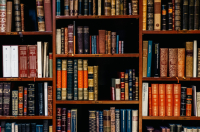Historical context
The writers we discussed in the first article changed the Russian language itself and introduced new genres and features to the national literature, creating a basis for everything that came next. Building on that, Russian literature came into its world-renowned greatness in the second half of the 19th century with novels, plays, and social commentary that changed literature forever. Romanticism gave way to realism as discussions of philosophical and religious ideas, ideologies, and the eternal search for truth came into sharp focus.
Key authors
It’s absolutely impossible to summarize the life’s work of such wordsmiths with diverse and multilayered bibliographies in just a couple of sentences, but here are some very brief notes on what they wrote about.
Ivan Turgenev (1818-1883)
Turgenev is one of the writers of the so-called natural school of Russian literature (pioneered by Gogol), which focused on realism, social struggles, the fate of lower- and middle-class people, and how ideas accepted in a society can influence an individual.
What to read: A Sportsman's Sketches (1852) – a compilation of short stories without a specific plot, a set of the author’s observations obtained during his stay in the countryside; Fathers and Sons (1862) – one of the masterpieces of the Golden Age, a novel focused on the ideological and intrapersonal challenges of the author’s time that nevertheless remains relevant today.
Leo Tolstoy (1828-1910)
One of the main subjects of Tolstoy’s bibliography is the search for truth – both in the ever-famous and marvelous (but also quite massive, so consider starting with something shorter) War and Peace (1869) and in his other books. His characters try different approaches towards existence and you as a reader get the chance to follow them on their paths.
What to read: Resurrection (1899) – one of my favorites, a novel with a profound discussion of social issues and how to deal with them as an individual; After the Ball (1911) – a short story critical of the hypocritical social hierarchy.
Fyodor Dostoevsky (1821-1881)
Gloomy St. Petersburg, the struggles of the poor, problems of faith and theology – those are the first things that come to mind when I think of Dostoevsky’s books. Each of his books is a classic – not much to add here, it’s better to see for yourself.
What to read: Crime and Punishment (1866) – a complex discussion of ethical and philosophical questions and, at the same time, a fascinating read that will excite you like no detective ever could; rather touching and heart-breaking short stories, such as White Nights (1848) and The Beggar Boy at Christ's Christmas Tree (1876).
Anton Chekhov (1860-1904)
More of a light read, if compared to the previously mentioned authors, I’d say – at least most of Chekhov’s bibliography is represented by shorter works. In the West, Chekhov is primarily famous for his plays, but I also recommend checking out his short stories. They are filled with harsh satire and irony but nevertheless point the way towards decency, beauty, and ideals.
What to read: various short stories – The Chameleon, (1884) and Ward No. 6, (1892) – and plays, such as The Seagull, (1896); the novella Steppe (1888).
We hope our extra brief summary of one of the most noteworthy periods of Russian literature will inspire you to pick up a book and delve further into the literary world. Stay tuned for more articles on Russian culture!




